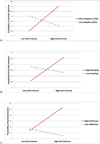Negative cognitive styles synergistically predict suicidal ideation in bipolar spectrum disorders: a 3-year prospective study
- PMID: 25660736
- PMCID: PMC4361270
- DOI: 10.1016/j.psychres.2014.12.042
Negative cognitive styles synergistically predict suicidal ideation in bipolar spectrum disorders: a 3-year prospective study
Abstract
Rates of suicidal ideation and behavior are extremely high in bipolar spectrum disorders (BSDs). However, relatively little work has evaluated potentially synergistic relationships between cognitive and emotion-regulatory processes proposed by theoretical models of suicidality in BSDs. The present study evaluated whether negative cognitive style and subtypes of rumination would exacerbate the impact of self-criticism on suicidal ideation in a prospective study of individuals with BSDs. Seventy-two young adults with BSDs (bipolar II, bipolar NOS, or cyclothymia) completed diagnostic interviews and trait measures of self-criticism, negative cognitive style, and brooding and reflective rumination at a baseline assessment. The occurrence of suicidal ideation was assessed as part of diagnostic interviews completed every 4 months for an average of 3 years of follow-up. Negative cognitive style and reflective rumination strengthened the association between self-criticism and the prospective occurrence of suicidal ideation across follow-up. Individuals with high levels of self-criticism in conjunction with negative cognitive style or reflective rumination were most likely to experience the onset of suicidal ideation. Self-criticism may work synergistically with negative cognitive style and rumination to confer risk for suicidal ideation in bipolar spectrum disorders. These results support theoretical models of suicidality in BSDs and indicate that evaluating and understanding negative cognitive styles may help to identify individuals who are at risk of suicide.
Keywords: Bipolar disorder; Bipolar spectrum; Cognitive styles; Rumination; Self-criticism; Suicidal ideation; Suicide.
Copyright © 2015 Elsevier Ireland Ltd. All rights reserved.
Figures
References
-
- Abramson LY, Alloy LB, Hogan ME, Whitehouse WG, Cornette M, Akhavan S, Chiara A. Suicidality and cognitive vulnerability to depression among college students: A prospective study. Journal of Adolescence. 1998;21(4):473–487. - PubMed
-
- Abramson LY, Metalsky GI, Alloy LB. Hopelessness depression: a theory-based subtype of depression. Psychological Review. 1989;96(2):358–372.
-
- Aiken LS, West SG. Multiple regression: Testing and interpreting interactions. London: Sage Publication Inc; 1991.
-
- Akiskal HS, Djenderedjian AH, Rosenthal RH, Khani MK. Cyclothymic disorder: validating criteria for inclusion in the bipolar affective group. American Journal of Psychiatry. 1977;134:1227–1233. - PubMed
-
- Alloy LB, Abramson LY, Walshaw PD, Cogswell A, Grandin LD, Hughes ME, Hogan ME. Behavioral Approach System and Behavioral Inhibition System sensitivities and bipolar spectrum disorders: prospective prediction of bipolar mood episodes. Bipolar Disorders. 2008;10(2):310–322. - PubMed
Publication types
MeSH terms
Grants and funding
LinkOut - more resources
Full Text Sources
Other Literature Sources
Medical


